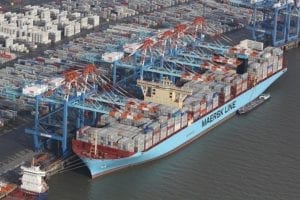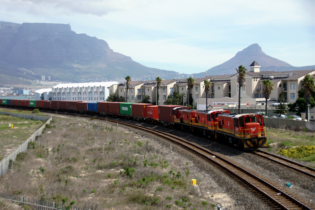The climate change challenge cannot be isolated from the on-going need for economic development in Africa, and the aim should be to reduce CO2 emissions whilst increasing trade and economic opportunities for the growing population on the continent.
Jonathan Horn, MD of Maersk Line Southern Africa, is shedding light on the environmental challenges that lie ahead, and aims to show that substantial reductions in CO2 are possible while still enabling trade and development across Africa. Horn explains that in order to create a sustainable low carbon economy, an efficient shipping sector is critical. “Maritime shipping is the most carbon-efficient method to transport goods – far more efficient than road or air transport. For example, transporting one ton of goods for one kilometre by air or truck emits 560 grams and 45 grams of CO2, respectively. If the same quantity of goods is transported by one of Maersk’s energy efficient Triple-E vessels as little as three grams of CO2 is emitted,” he says. 90% of global trade by volume travels by sea and trade is crucial in the pursuit of creating development opportunities. According to the World Bank, no country has significantly increased per capita income the last 50 years without greatly expanding trade. Horn therefore highlights the need for a more sustainable and efficient trading environment in order to effectively reduce the environmental impacts of trade, still enabling growth.“The choice of transportation method plays a significant role in the level of CO2 emitted during the transport process. We are committed to further accelerating growth on the African continent while at the same time raising the bar on carbon efficiency. Our commitment is long-term, as is our history in Africa,” Horn adds.
Since 2007, the Maersk Group’s shipping company, Maersk Line, has proven that shipping can decouple growth and fossil fuel consumption, already having reduced emissions per container moved by 42% by end 2015 from a 2007 baseline. “Maersk Line has driven energy efficiency improvements across the company, pioneering initiatives ranging from network design and speed optimisation, to technical upgrades and the deployment of new and more efficient ships in its network, such as the Triple-E vessels.” Despite CO2 emissions remaining relatively low in Africa, when compared to other more developed regions, severe consequences can be felt throughout the continent. According to the 2016 Climate Change Vulnerability Index, eight out of the ten countries most vulnerable to climate change are in Africa. The continent is suffering from increased climate-related ‘shocks’, such as the extreme drought that has persisted across Southern Africa, exacerbated by an exceptionally strong El Niño weather pattern. “Reducing our carbon footprint remains at the core of our commitment. The Maersk Group is pursuing energy efficiency across its entire portfolio and have set a target to improve CO2 efficiency across the group by 30% by 2020, compared to the 2010 baseline. By the end of 2015, Maersk Group had achieved a 23% improvement,” he says.






